Is Dr. Martin Luther King Jr.’s dream still alive? Are we making progress? We asked people who live and work on the South L.A. street what they think.
Decades ago comedian Chris Rock had a joke about Martin Luther King Dr.
“Martin Luther King stood for nonviolence,” Rock said in his breakthrough HBO stand-up special “Bring the Pain” (1996). “Now what’s Martin Luther King? A street. And I don’t give a fuck where you are in America, if you on Martin Luther King Boulevard, there’s some violence going down.”
Rock then says if you are lost on King Blvd. at night you should “run. Run! Run!”
We went to Los Angeles’ own MLK Blvd. near South Western Ave. to see if that controversial joke still rings true nearly 25 years later. Here’s some of the people we talked with.
Charles Hilson, 73. Born in Chicago, moved to L.A. 30 years ago.
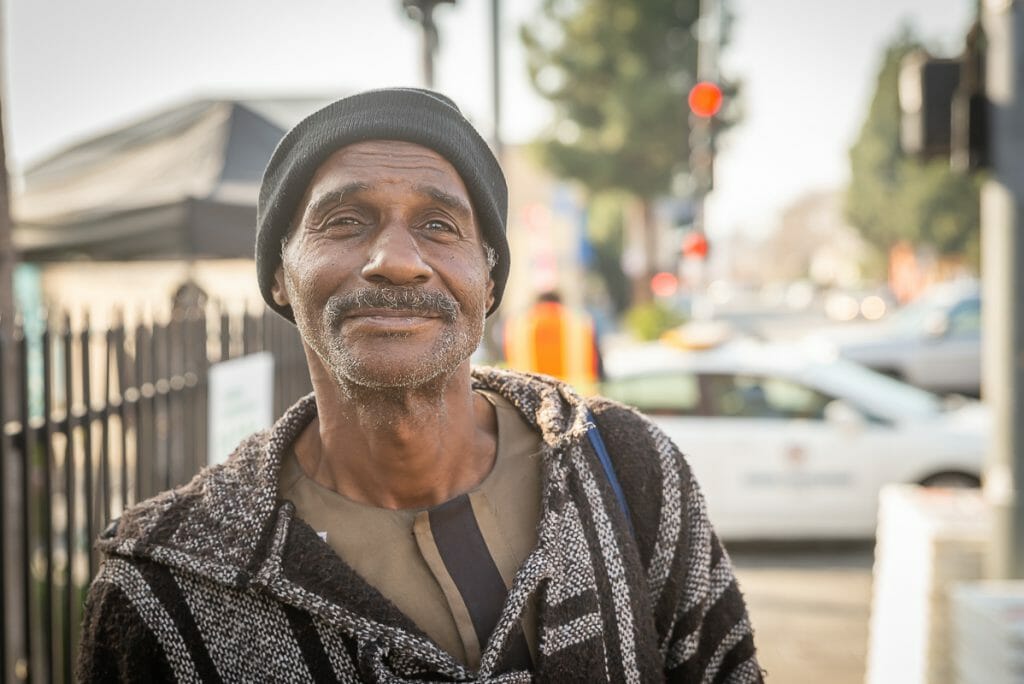
“Martin Luther King Blvd. was a street full of life back in the ’30s and ’40s. when it was called Santa Barbara St. People enjoyed themselves, had a good time here. Dancing, singing. Things have changed of late,” Hilson, a tall, affable man said as he waited for the bus to come.
When asked if he thinks the civil rights activist’s dream is still alive, he says, “we still remember him, and we remember the message that he carried for all of us: that we are one people. We are all God’s children.”
As in most conversations about social change, the topic quickly segues to politics. Hilson says that he feels “terribly disappointed,” with the Trump administration after the strides President Obama made with social progress. “I’m afraid Trump’s gonna have someone drop a missile on us before he drop one. It’s a sad affair, and it scares me. “
Hilson says that in his 73 years he has seen a lot, and enjoyed most of it. He even remembers being a young person in his hometown of Chicago when MLK was getting front-page attention.
“It was a moment in time that brought people together,” he recalls. “There was more understanding. And we talked more to each other. There was not this madness that there is today… There weren’t people on the streets, in the sidewalks, in tents with their kids. It’s sad now. But one day at a time we are gonna bring it back.”
Moses Perez is the owner of Perez Discount Store, which has been located on Martin Luther King Blvd. for three years. Moses moved to L.A. from Washington D.C. eight years ago. He’s originally from Guatemala.
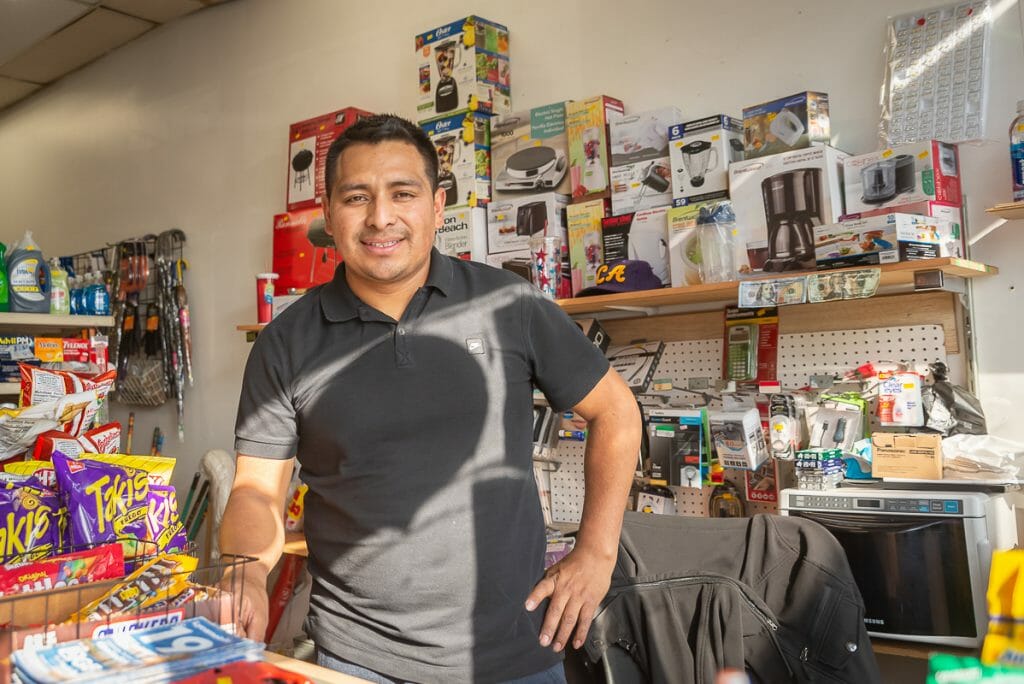
“Just like in the history of this country… everything changes when someone with a brilliant mind comes out and breaks through,” Moses Perez says in front of his store at 1661 W. MLK Blvd. “It changes everything that was before. After Martin Luther King, everything was different.”
Is MLK known in Guatemala?
“He’s known by college students,” Perez says. “We study the history of the United States… how it started, the first president, the current president, how many states, what’s the capital, why Thanksgiving, and all that stuff. But, other than that, people don’t really know of him in Guatemala.”
Even though Perez is an optimistic, good-natured person, he thinks the U.S. is sliding away from King’s Dream.
“In a way we are losing those thoughts, those ideas that Martin Luther King said and taught,” Perez says. “Right now we are kind of forgetting about it. The current president has said many [disrespectful] things about Hispanic people, and about Afro-American people,” which he says have set King’s idealistic tone backwards.
The disrespect that Perez feels from the White House is in deep contrast to what he is shown by his clients and neighbors in South L.A. each day.
“Customers in this area, particularly on Martin Luther King Blvd., they’re… they’re special,” Perez says with a smile. “They’re different races, mostly African-Americans and Hispanic. We all get along with each other. We all respect each other. It used to be that MLK Blvd. was a really dangerous place where you could not walk in the streets after dark. Thank God, right now, it’s different. This environment is changing, little-by-little.”
Albert Robles, 36, security guard. Native South L.A. resident.
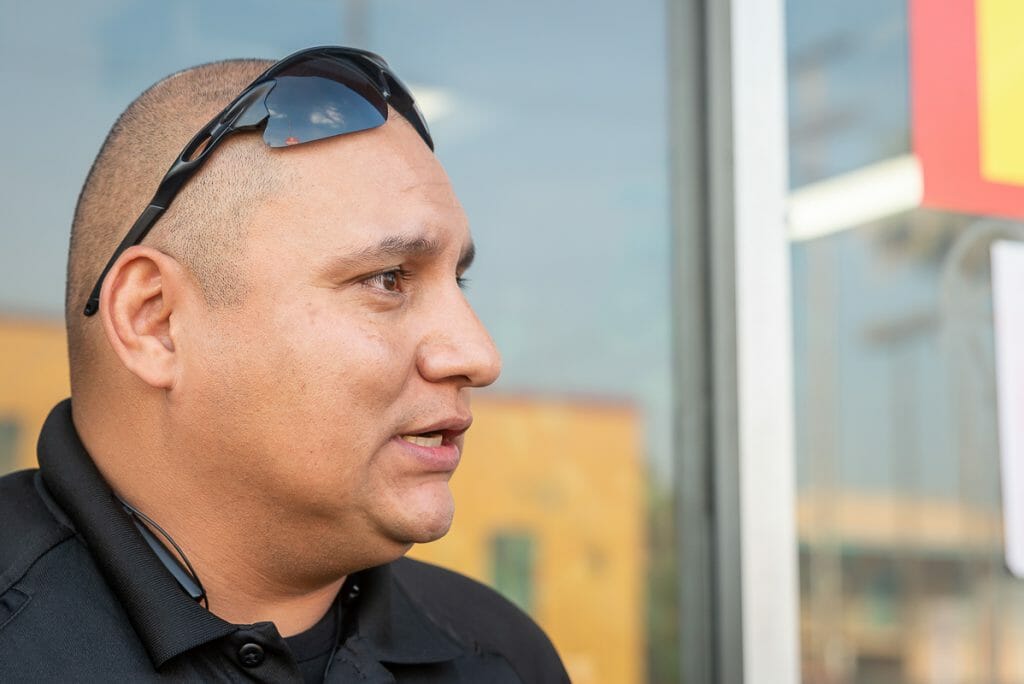
Albert Robles grew up during a rough time in South L.A. when gangs, riots and distrust of police riddled his hometown. It made him want to be part of the change that would make his younger family members and kids better mirror Martin Luther King’s dream.
“I would say we have moved closer,” to MLK’s dream, he says. “There’s a lot of changes and the community is coming together. Speaking for myself, I have changed.”
Robles grew up in a large home of 12 brothers and sisters, and his mother passed away when he was 18, which led him to stepping up to raise six of his younger siblings.
“Everything starts from home: how you act, if you are against violence. And me, being born in this area, you face that a lot,” he says.
Is MLK Blvd. safer today compared to when he grew up near here?
“Yes. I would say everybody, including the businesses here, we all try to take care of each other,” he says. “If we see something wrong, we speak out. In order for us to be safe, not only should one do it, it has to be a bundle of people. People say it’s really dangerous here. Even some of the other guards that work around here. I think it’s just a fear. People don’t understand.”
Danny King, 24, sign-spinner, rapper. Native Angeleno.
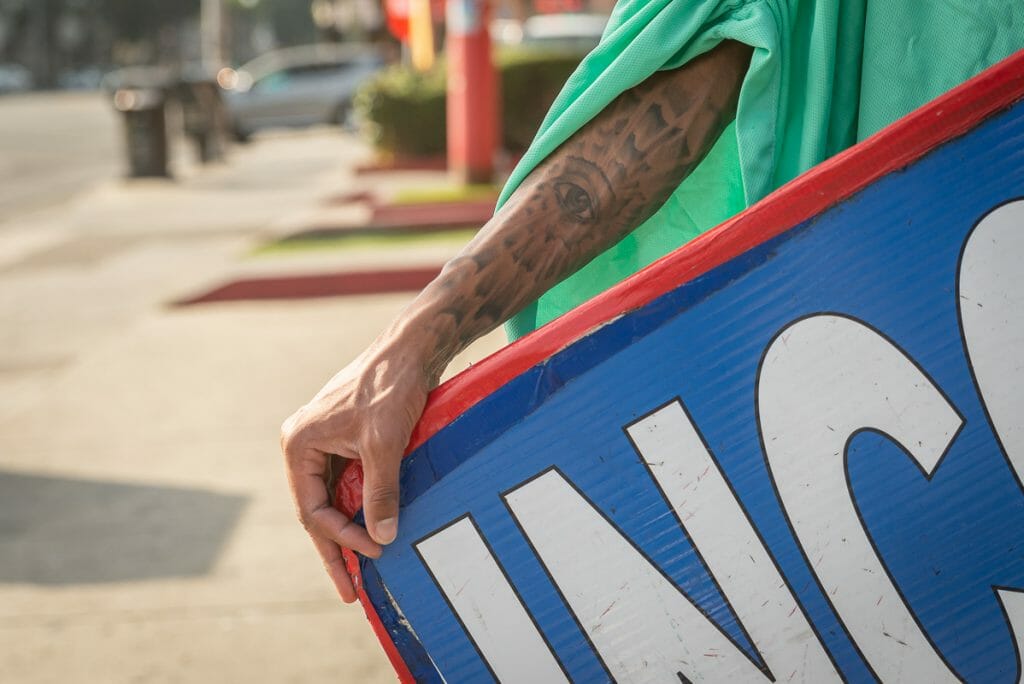
Danny King is dressed up as the Statue of Liberty, and twirling a sign encouraging people to have their taxes done at a business in the strip mall on Martin Luther King Blvd.
As we begin talking, a pair of men in a pick-up truck whose cargo bed is filled with loose tires honks at a man walking down South Western Ave. The pedestrian flashes some gang signs, which infuriates the men in the truck and they slow down as they cross King Blvd. to engage in an angry dialogue through the intersection.
King, who talks in a smooth way, whose tattooed arms and hands poke out through his costume, seems distressed until he starts talking about the street that this is all about to go down on.
“When I think of MLK, I think of a street dedicated to a man who’s done a lot for his people who were experiencing so much injustice,” he says, now relieved that the truck has continued its journey south.
“We’re reaching MLK’s dream slowly. It’s slow due to the violence,” he says gesturing to the intersection. “All this shit that happens to you when you’re oppressed for so long — people aren’t used to experiencing so much triumph.”
Genesis Reyes, 22. Native South L.A. resident.
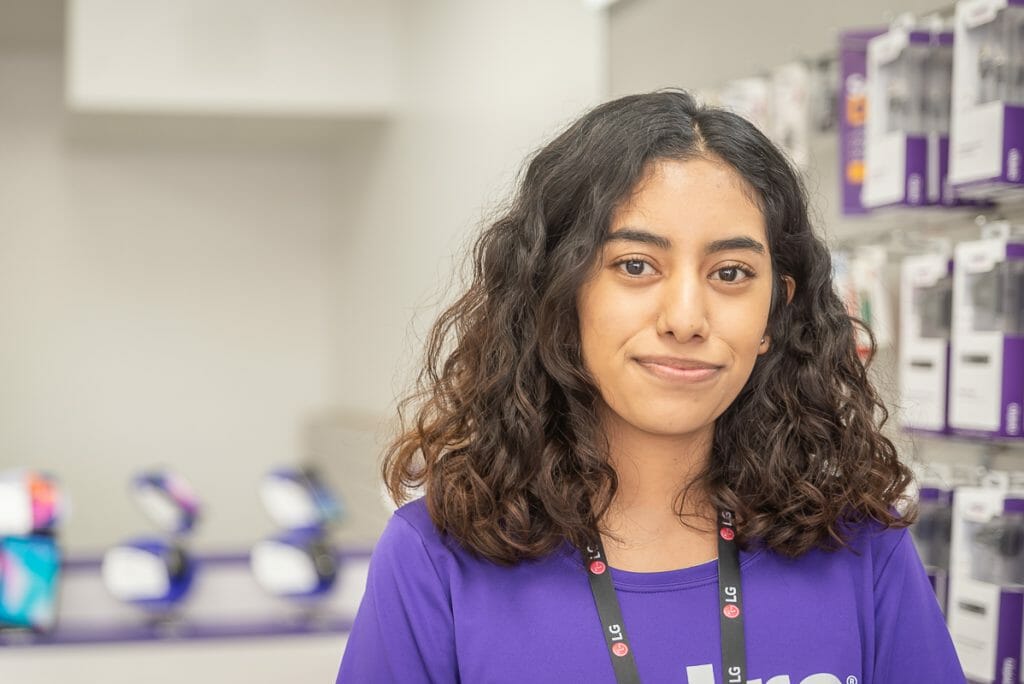
Genesis Reyes is a first-generation Latina woman whose mother was from El Salvador but raised in Costa Rica. Her father is Guatemalan. Genesis was born and raised in L.A. and now works at a mobile phone store on Martin Luther King Blvd. She is upbeat and knowledgeable.
When she thinks of Dr. King she thinks of freedom and progress. “Many of the good things that have been happening are due to him and people like him,” she says, adding that King’s work helped more than just black people.
“What he did was universal,” she says. “We really wouldn’t be here — because back then Latinos also had to face those same issues, and it kind of intertwined.”
Do you feel safe working on King Blvd.?
“From my perspective, yes. But others who don’t live here, they don’t think it’s safe. But here’s cool,” she says.
Manuel Medina, 30. Originally from Palm Springs.
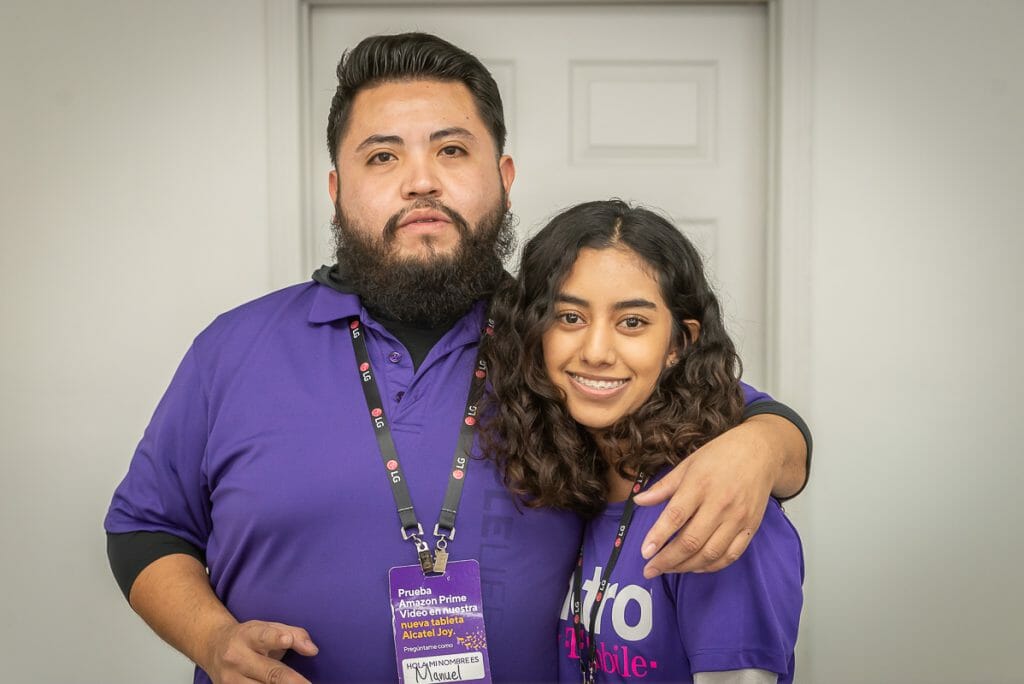
Manuel Medina is Genesis’s boss. A recent resident of our fair city, the 30-year old appreciates the energy of Los Angeles.
“I love L.A. It’s not quiet,” he says. “It’s not boring. If you go to Palm Springs it’s like a retirement home.”
He says working on Martin Luther King Blvd. is fine, safe and people are nice to each other. What surprised him was how many more “flip phones” he sells there than he did in Palm Springs. “Some people don’t want to use social media here,” he says. “They don’t want to watch YouTube on their phone. Some people just want to talk and do their thing.”
James Stewart, senior citizen. Born in Mississippi, moved to L.A. when he was 15.
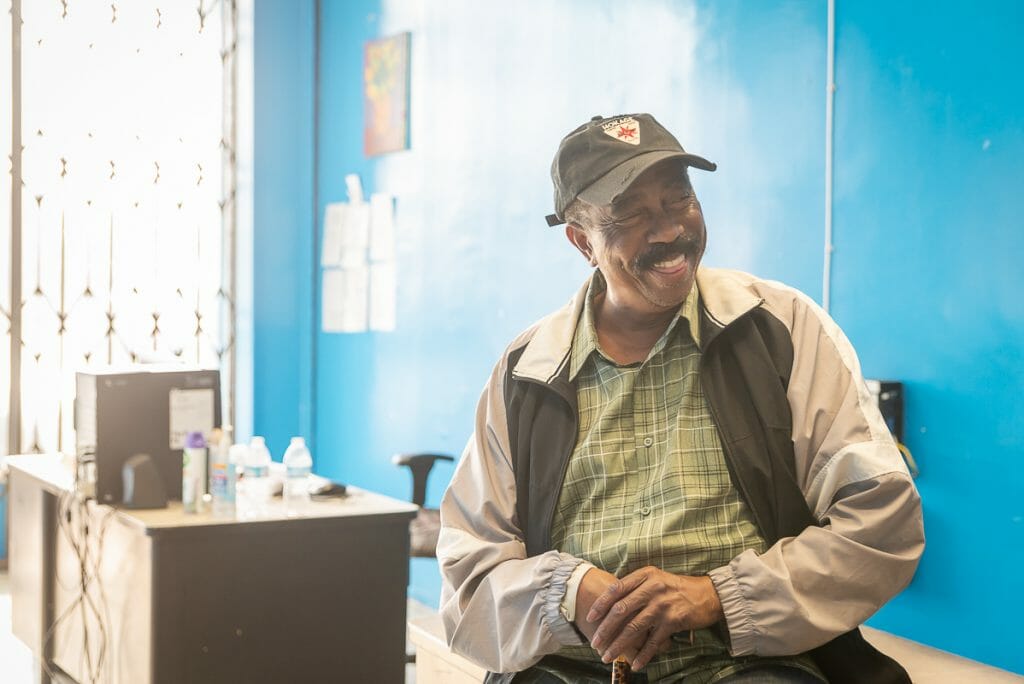
“MLK’s dream has not been fulfilled yet,” Stewart says from his office on Martin Luther King Blvd. He owns a company that helps those who were born with disabilities find assistance.
“We still have racism in this country. Prejudice,” he says. “Remember his ‘I Have A Dream’ speech where he says he wants little black kids and little white kids to walk hand-in-hand together? We aren’t near that. We’re not there. But he has opened some doors.”
Stewart went on, “we have a whole lot of opportunities today that we didn’t have before Martin Luther King rode the bus and walked with Rosa Parks.”
Something that King’s legacy helped pave the way for was for there to be a black President of the United States. Did Stewart ever think that would happen in his lifetime?
,
“No, I did not. Absolutely not,” he says.
But the pendulum has swung and Stewart now says that “racism is at an all-time high under President Trump.” Stewart is critical of Obama as well, “he didn’t make all the changes I thought he would make. But the country was better off then than it is now — Trump has poisoned people’s minds. He has set this country back 10 or 15 years. Because a lot of white people who were in the middle of the road, they’ve gone to the right.”
Stewart says if Trump loses in November, the country will go back to the path of MLK’s dream.
But he says it will only happen if “the people in the middle made a mistake by voting for Donald Trump.”

